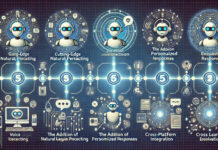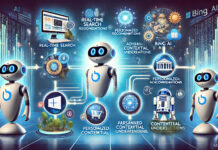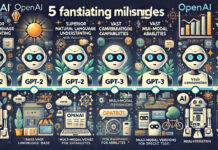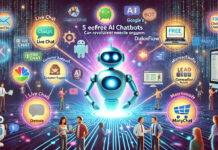Artificial Intelligence (AI) is rapidly changing various industries, including software engineering. The integration of AI in software development is creating a cooperative relationship between human engineers and intelligent machines. This collaboration boosts productivity, efficiency, and innovation while presenting new challenges and opportunities. This article explores how AI and software engineers work together, the benefits of this partnership, and its future implications for the industry.
The Role of AI in Software Engineering
AI is transforming software engineering by automating repetitive tasks, improving code quality, and enhancing decision-making. Here are key areas where AI is making an impact:
Automated Code Generation
AI tools, like GitHub Copilot, generate code snippets based on comments and context from developers. These tools use machine learning to understand the intent behind the code and produce relevant suggestions. This speeds up coding and allows engineers to focus on complex and creative tasks.
Code Review and Bug Detection
AI algorithms analyze code to identify bugs, security issues, and areas for improvement. Tools like DeepCode and CodeGuru use machine learning to detect patterns that may lead to errors. Real-time feedback from these tools helps maintain high code quality and reduces the risk of bugs in production.
Documentation and Code Commenting
Good documentation is essential for maintaining and scaling software projects. AI assists in generating and updating documentation by analyzing the codebase and creating relevant comments. This keeps documentation accurate and up-to-date, making it easier for new contributors to understand the project.
Enhancing Collaboration Between Humans and Machines
AI integration in software engineering fosters a collaborative environment where human engineers and intelligent machines work together. Here are ways AI enhances collaboration:
Task Automation
AI automates routine tasks, such as code formatting, testing, and deployment. This reduces engineers’ workload and allows them to focus on strategic and innovative tasks. Automation also ensures consistency and accuracy in these processes, improving overall efficiency.
Personalized Learning and Skill Development
AI-driven platforms offer personalized learning experiences for software engineers. By analyzing individual performance and learning styles, AI recommends targeted training materials and resources. This helps engineers stay updated with the latest technologies and continuously improve their skills.
Intelligent Project Management
AI streamlines project management by analyzing data and providing insights into task prioritization, resource allocation, and progress tracking. This enables project managers to make informed decisions and optimize team performance. AI tools can also predict potential project risks and suggest mitigation strategies.
Benefits of the Symbiotic Relationship
The collaboration between AI and software engineers offers numerous benefits:
Increased Productivity
AI automates repetitive tasks and provides intelligent assistance, helping engineers complete work more efficiently. This leads to increased productivity and faster delivery of high-quality software.
Enhanced Innovation
AI frees up time for engineers to focus on creative problem-solving and innovation. This fosters a culture of experimentation and continuous improvement, driving technological advancements.
Improved Code Quality
AI-powered tools provide real-time feedback and suggestions, helping engineers write cleaner and more maintainable code. This reduces bugs and security vulnerabilities, resulting in more robust software.
Cost Savings
AI reduces operational costs by automating tasks and improving efficiency. This allows companies to allocate resources more effectively and invest in strategic initiatives that drive growth.
Challenges and Ethical Considerations
While AI offers significant benefits, it also presents challenges and ethical considerations:
Job Displacement
Automation of certain tasks may lead to concerns about job displacement for engineers. However, AI should be seen as a tool that enhances human capabilities rather than replacing them. Engineers can focus on creative and strategic tasks, continuing to add value and drive innovation.
Algorithmic Bias
AI algorithms can exhibit bias if trained on biased data. This can lead to unfair or inaccurate outcomes in software development. Ensuring that AI systems are trained on diverse datasets is crucial to minimize bias and promote fairness.
Data Privacy and Security
AI in software engineering involves collecting and analyzing large amounts of data. Ensuring data privacy and security is paramount to protect sensitive information and maintain trust. Organizations must implement robust data protection measures and comply with regulations.
The Future of AI and Software Engineering
The relationship between AI and software engineers will continue to evolve, shaping the industry’s future. Here are some potential developments:
Advanced AI Capabilities
As AI technologies advance, their capabilities in software engineering will become more sophisticated. They will handle more complex tasks, provide deeper insights, and make more accurate predictions.
Greater Collaboration
The collaboration between AI and software engineers will become more seamless and integrated. AI will be an indispensable tool in the development process, enhancing human creativity and productivity.
New Opportunities
AI integration in software engineering will create new learning and growth opportunities. Engineers will need to develop new skills and adapt to changing technologies, fostering a culture of continuous improvement and innovation.
Conclusion
The symbiotic relationship between AI and software engineers is transforming the software development landscape. By automating routine tasks, enhancing collaboration, and improving code quality, AI empowers engineers to achieve greater productivity and innovation. While challenges and ethical considerations must be addressed, the future of AI and software engineering looks promising. As technology evolves, this partnership will drive the industry forward, creating new opportunities and shaping the future of software development.
For more insights into the impact of AI on various fields, stay tuned to our series on AI technologies, Opinions and Analyses.



